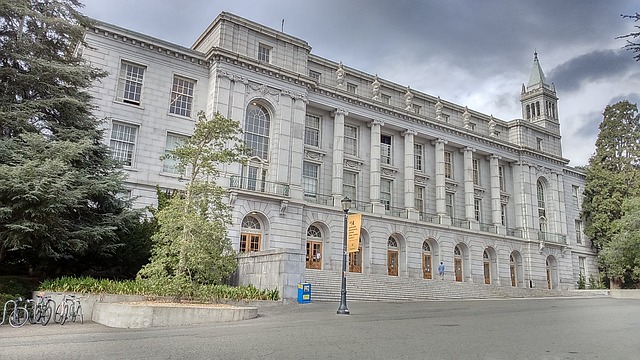
UC Berkeley campus building
A recent study at UC Berkeley by the Berkeley Underground Scholars found that a college degree isn’t as much of a benefit to previously incarcerated job seekers as one might expect. To overcome the hiring bias against those with criminal records the researchers recommend systematic change – change that would ensure that these individuals also have a fair chance at gaining employment.
The research was conducted by students Michael Cerda-Jara and Aminah Elster, along with David J. Harding, a sociology professor and director of the UC Berkeley’s Social Science D-Lab. Cerda-Jara and Elster are both active leaders of Berkeley Underground Scholars, an organization that paves the way to college for previously and currently incarcerated individuals and those impacted by the system.
Their research findings are significant, because it is estimated that more than one-quarter of all previously incarcerated people between the ages of 18 and 25 will enroll in higher education at some point after their release.
How the study was conducted
The researchers submitted 1,798 online job applications that used fabricated resumes and cover letters to potential employers across California. These employers were located in Oakland, San Jose, Los Angeles, San Diego, Sacramento and San Bernardino.
The “applicants” – all men – included white, black and Latinx job seekers. They also each indicated a specific incarceration and education history, with some “applicants” having no criminal record, others having earned a bachelor’s degree before being incarcerated and still others having earned a bachelor’s degree after being incarcerated.
Can a college degree override a criminal record?
What the researchers discovered is that even with a college degree, those with a criminal record have a harder time getting called for interviews. In fact the callback rate for the study was 8% for those with a bachelor’s degree and without a record and 4% for those with a record who also had a bachelor’s degree – 50% less – regardless of whether they received it pre- or post-incarceration.
Changes that could help eliminate discrimination
Based on that reality, the UC Berkeley researchers recommend policy changes that go beyond Ban the Box, which still allows employers to investigate criminal record – just later in the hiring process. More systemic change is needed.
Here are their suggestions:
- Institute anti-discrimination laws that protect those with criminal records, preventing their past from disqualifying them from a job, with certain exceptions.
- Ban the investigation of criminal records from the hiring process.
- Expand the ability for those with misdemeanors and some felony convictions to expunge them. A study done by Professors J.J. Prescott and Sonja B. Starr of the University of Michigan Law School that was published last year in the Harvard Law Review found that the wages of those who get their records expunged go up on average more than 22% within the first year. They credit this to the fact that more people either find a job after being unemployed or find a better, higher-paying job.
- Reduce the laborious process of obtaining a Certificate of Rehabilitation – the court order that declares a person convicted of a felony has been rehabilitated – and make it automatic.
- Eliminate all bans on occupational licensing. An estimated one-quarter of all jobs in the U.S. require some type of licensing, and some of these licenses cannot be obtained by those with a criminal record. Occupational licensing is determined at the state level, and an estimated 32,000 laws nationwide related to occupational and business licensing include a consideration of criminal records. Getting rid of this consideration would not only help those with records secure employment but would also reduce recidivism. A study conducted by researchers at the University of Arizona, in fact, found that between 1997 and 2007, “the states with the heaviest occupational licensing burdens saw an average increase in the three-year, new-crime recidivism rate of over 9%. At the same time, the states that had the lowest burdens and no such character provisions saw an average decline in that recidivism rate of nearly 2.5%.” California made history last month when it passed California Assembly Bill No. 2147, a law that allows those who participated in a state or county fire camp to apply for expungement upon release. As a result, they will be able to seek a variety of jobs, including those that require an occupational license.
Editor’s note:
Completing online job applications and waiting to be contacted is commonly known to have a dismal payoff when it comes to obtaining an interview. This applies to anyone, whether previously incarcerated or not. Job seekers can and should implement more effective methods. How and when the candidate shares their record can make a huge difference.
And since most employers run background checks, it’s important for the job candidate to preempt the issue during a face-to-face interview, before the employer discovers it on their own. A job candidate being able to incorporate the fact that they have a bachelor’s degree as part of a face-to- face interview, especially if it was undertaken or completed while incarcerated or post-incarceration, can provide further evidence of their rehabilitation and transformation. It also indicates that their past incarceration does not define them.
Previously incarcerated job seekers can also improve their interview outcomes and success by following the advice in these articles: turnaround talk, turnaround packet, letters of recommendation and references may be key to helping ex-offenders find a job.


